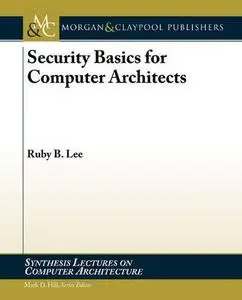Security Basics for Computer Architects by Ruby B. Lee
English | PDF | 2013 | 113 Pages | ISBN : 1627051554 | 5.5 MB
Design for security is an essential aspect of the design of future computers. However, security is not well understood by the computer architecture community. Many important security aspects have evolved over the last several decades in the cryptography, operating systems, and networking communities. This book attempts to introduce the computer architecture student, researcher, or practitioner to the basic concepts of security and threat-based design. Past work in different security communities can inform our thinking and provide a rich set of technologies for building architectural support for security into all future computers and embedded computing devices and appliances. I have tried to keep the book short, which means that many interesting topics and applications could not be included. What the book focuses on are the fundamental security concepts, across different security communities, that should be understood by any computer architect trying to design or evaluate security-aware computer architectures.



